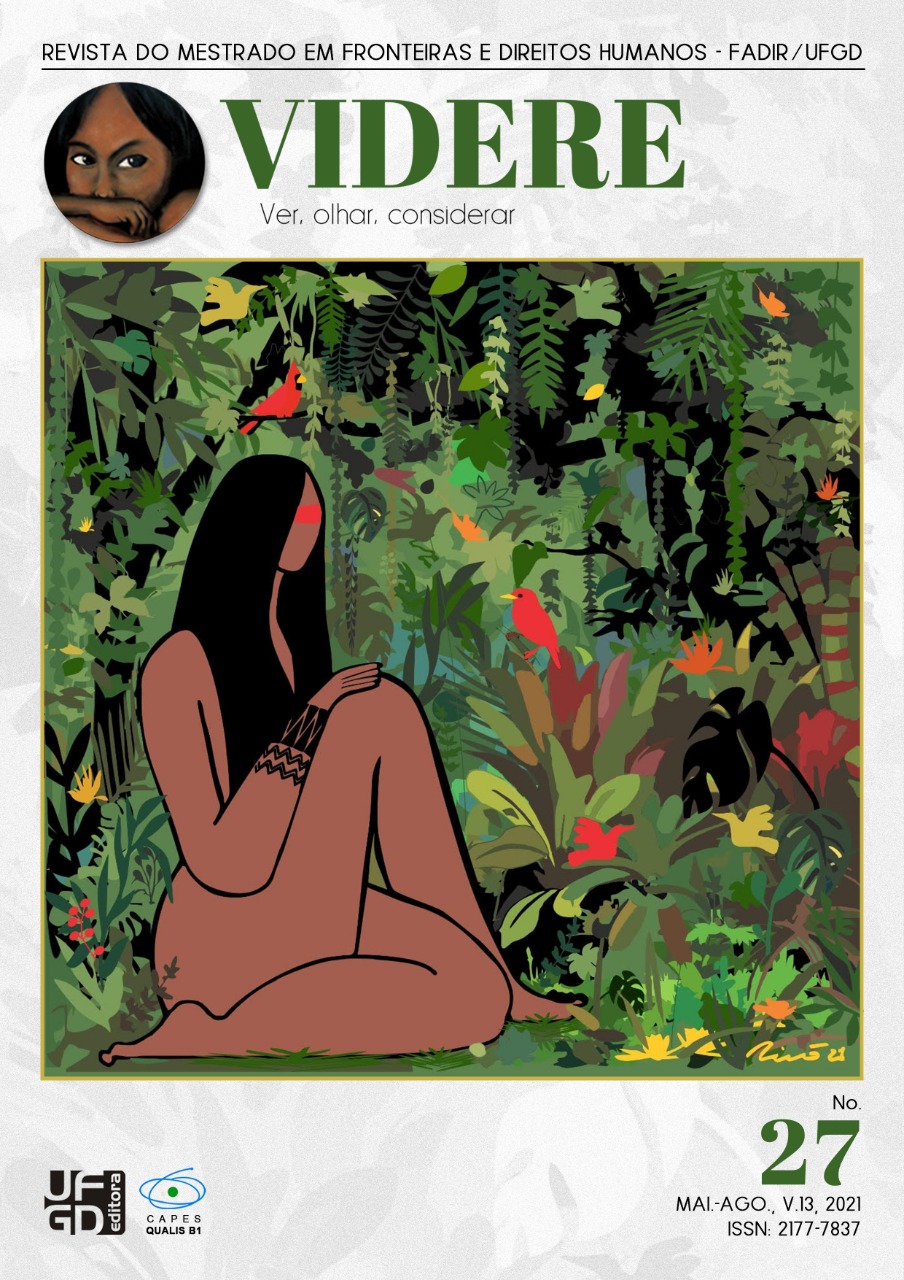A “multidão” hardt-negriana: apontamentos críticos
DOI:
https://doi.org/10.30612/videre.v13i27.13163Keywords:
Multidão. revolução. sujeito. classes sociais. espontaneidadeAbstract
O texto apresenta, em linhas gerais, o conceito de “Multidão” desenvolvido nas obras do filósofo italiano Antonio Negri e do teórico literário norte-americano Michael Hardt. O entendimento da “Multidão” como novo “sujeito” revolucionário, formado por singularidades cooperativas e não-unificadas (em nenhuma instância), instiga a muitos e levanta críticas de tantos outros. O artigo apresenta algumas críticas ao conceito de “Multidão”, especialmente por seu afastamento/denúncia acerca da categoria de classes sociais, por sua imprecisão conceitual, por sua construção discursivo-filosófica apartada de dados empíricos sólidos e por sua aposta no espontaneidade das massas revoltosas que, sem qualquer organização política mais consistente, seriam aptas a fazer avançar uma Revolução.
Downloads
References
BIDET, Jacques. A multidão perdida no império. In: Crítica Marxista. Campinas: Revan, 2004. n. 19.
BLOCH, Ernst. Thomas Müntzer – teologo de la revolución. Madri: Antonio Machado, 2002.
BORÓN, Atilio A. Imperio & imperialismo: una lectura crítica de Michael Hardt y Antonio Negri. 5.ed. Buenos Aires: CLACSO, 2004.
BULL, Malcolm. You can’t build a new society with a Stanley knife. In: London Review of Books. Londres: London Review of Books, 2001. v. 23, n. 19.
COCCO, Giuseppe. Giuseppe Cocco fala sobre o conceito de multidão e os movimentos sociais. Revista Eletrônica Portas. Rio de Janeiro, v. 1, n. 1, dez. 2007. Disponível em <http://www.acicate.com.br/portas/giuseppe.pdf>. Acesso em: 01 nov. 2020.
COCCO, Giuseppe; NEGRI, Antonio. Glob(AL): biopoder e lutas em uma América Latina globalizada. Rio de Janeiro: Record, 2005.
DICIONÁRIO ONLINE DE PORTUGUÊS. Parúsia. Disponível em: <https://www.dicio.com.br/parusia-2/>. Acesso em 01 nov. 2020
EAGLETON, Terry. As ilusões do pós-modernismo. Rio de Janeiro: Jorge Zahar, 1998.
EAGLETON, Terry. Depois da teoria – um olhar sobre os Estudos Culturais e o pós-modernismo. Rio de Janeiro: Civilização Brasileira, 2016.
ESPINOSA, Baruch de. Tratado teológico-político. São Paulo: Martins Fontes, 2003.
FANON, Frantz. Os condenados da terra. Juiz de Fora: Editora UFJF, 2006.
GALILEIA, Segundo. Teologia da libertação: ensaio de síntese. 3. ed. São Paulo: Edições Paulinas, 1982.
HARDT, Michael; NEGRI, Antonio. Império. Rio de Janeiro: Record, 2001.
HARDT, Michael; NEGRI, Antonio. Multidão: guerra e democracia na era do Império. Rio de Janeiro: Record, 2005.
HARDT, Michael; NEGRI, Antonio. Bem-estar comum. Rio de Janeiro: Record, 2016.
HARVEY, David. A condição pós-moderna: uma pesquisa sobre as origens da mudança cultural. São Paulo: Edições Loyola, 1992.
HARVEY, David. Commonwealth: an exchange. In: Artforum. Nova Iorque: Artforum International Magazine, 2009. n. nov. 2009.
JAMESON, Fredric. A virada cultural: reflexões sobre o pós-moderno. Rio de Janeiro: Civilização Brasileira, 2006.
JAMESON, Fredric. Postmodernism – or, the cultural logic of late capitalism. Durham: Duke University Press, 1991.
KOHAN, Néstor. O Império de Hardt & Negri: para além das modas, “ondas” e furores. In: BORÓN, Atilio (org). Filosofia Política Contemporânea: Controvérsias sobre Civilização, Império e Cidadania. Buenos Aires: CLACSO, 2006.
LACLAU, Ernesto. A razão populista. São Paulo: Três Estrelas, 2013.
LÖWY, Michael. O que é cristianismo da libertação? Religião e política na América Latina. São Paulo: Expressão Popular, 2016.
MARX, Karl. Grundrisse: manuscritos econômicos de 1857-1858 – esboços da crítica da economia política. São Paulo: Boitempo, 2011.
MARXWIKI. Lumpenproletariat. Disponível em: <https://web.archive.org/web/20100717131508/http://machines.pomona.edu/marxwiki/index.php/Lumpenproletariat>. Acesso em 01 nov. 2020.
MASO, Juan Dal. Toni Negri o la decadência del autonomismo. In: IPS Blog de Debate. Disponível em <http://www.ips.org.ar/?p=986> Acesso em: 01 nov. 2020.
MOUFFE, Chantal. Por um populismo de esquerda. São Paulo: Autonomia Literária, 2019.
NEGRI, Antonio. Para uma definição ontológica da Multidão. In: Lugar Comum. Rio de Janeiro, n. 19-20, jan-jun. 2004. Disponível em <http://uninomade.net/wp-content/files_mf/113103120455output19-20.pdf>. Acesso em: 01 nov. 2020.
TURCHETTO, Maria. The Empire strikes back: on Hardt and Negri. In: Historical Materialism. Leiden: Koninklijke Brill, 2003. v. 11. n. 1. UNINÔMADE BRASIL. Quem somos. Disponível em: <http://uninomade.net/quem-somos/>. Acesso em: 01 nov. 2020.
ZIZEK, Slavoj. A tinta vermelha: discurso de Slavoj Zizek aos manifestantes do movimento Occupy Wall Street. In: Blog da Boitempo. Disponível em <http://blogdaboitempo.com.br/2011/10/11/a-tinta-vermelha-discurso-de-slavoj-zizek-aos-manifestantes-do-movimento-occupy-wall-street/> Acesso em: 01 nov. 2020.
Downloads
Published
How to Cite
Issue
Section
License
Authors must accept the publication rules when submitting the journal, as well as agree to the following terms:
(a) The Editorial Board reserves the right to make changes to the Portuguese language in the originals to maintain the cultured standard of the language, while respecting the style of the authors.
(b) Authors retain the copyright and grant the journal the right to first publication, with the work simultaneously licensed under the Attribution-NonCommercial-ShareAlike 3.0 Brazil (CC BY-NC-SA 3.0 BR) that allows: Share - copy and redistribute the material in any medium or format and Adapt - remix, transform, and create from the material. CC BY-NC-SA 3.0 BR considers the following terms:
- Attribution - You must give the appropriate credit, provide a link to the license and indicate whether changes have been made. You must do so under any reasonable circumstances, but in no way that would suggest that the licensor supports you or your use.
- NonCommercial - You may not use the material for commercial purposes.
- Sharing - If you remix, transform, or create from material, you must distribute your contributions under the same license as the original.
- No additional restrictions - You may not apply legal terms or technological measures that legally restrict others from doing anything that the license permits.
(c) After publication, authors are allowed and encouraged to publish and distribute their work online - in institutional repositories, personal page, social network or other scientific dissemination sites, as long as the publication is not for commercial purposes.



















